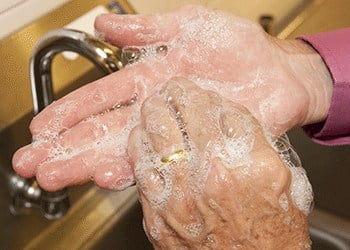When you’re buying soaps and body washes, do you reach for the bar or bottle labeled “antibacterial”? Are you thinking that these products, in addition to keeping you clean, will reduce your risk of getting sick or passing on germs to others?
Not necessarily, according to experts at the Food and Drug Administration (FDA).
Every day, consumers use antibacterial soaps and body washes at home, work, school and in other public settings. Especially because so many consumers use them, FDA believes that there should be clearly demonstrated benefits to balance any potential risks.
In fact, there currently is no evidence that over-the-counter (OTC) antibacterial soap products are any more effective at preventing illness than washing with plain soap and water, says Colleen Rogers, Ph.D., a lead microbiologist at FDA.
Moreover, antibacterial soap products contain chemical ingredients, such as triclosan and triclocarban, which may carry unnecessary risks given that their benefits are unproven.
“New data suggest that the risks associated with long-term, daily use of antibacterial soaps may outweigh the benefits,” Rogers says. There are indications that certain ingredients in these soaps may contribute to bacterial resistance to antibiotics, and may have unanticipated hormonal effects that are of concern to FDA.
In light of these data, the agency issued a proposed rule on Dec. 16, 2013 that would require manufacturers to provide more substantial data to demonstrate the safety and effectiveness of antibacterial soaps. The proposed rule covers only those consumer antibacterial soaps and body washes that are used with water. It does not apply to hand sanitizers, hand wipes or antibacterial soaps that are used in health care settings such as hospitals.
According to Rogers, the laboratory tests that have historically been used to evaluate the effectiveness of antibacterial soaps do not directly test the effect of a product on infection rates. That would change with FDA’s current proposal, which would require studies that directly test the ability of an antibacterial soap to provide a clinical benefit over washing with non-antibacterial soap, Rogers says.
What Makes a Soap “Antibacterial?”
Antibacterial soaps (sometimes called antimicrobial or antiseptic soaps) contain certain chemical ingredients that plain soaps do not. These ingredients are added to many consumer products in an effort to reduce or prevent bacterial contamination.
A large number of liquid soaps labeled “antibacterial” contain triclosan, an ingredient of concern to many environmental and industry groups. Animal studies have shown that triclosan may alter the way hormones work in the body. While data showing effects in animals don’t always predict effects in humans, these studies are of concern to FDA as well, and warrant further investigation to better understand how they might affect humans.
In addition, laboratory studies have raised the possibility that triclosan contributes to making bacteria resistant to antibiotics. Such resistance can have a significant impact on the effectiveness of medical treatments.
Moreover, recent data suggest that exposure to these active ingredients is higher than previously thought, raising concerns about the potential risks associated with their use regularly and over time.
A Chance to Weigh In
FDA encourages consumers, clinicians, environmental groups, scientists, industry representatives and others to discuss and weigh in on the proposed rule and the data it discusses. The comment period extends for 180 days.
In the meantime, FDA is emphasizing that hand washing is one of the most important steps people can take to avoid getting sick and to prevent spreading germs to others. Another good source for tips and information about benefits of appropriate hand washing is the Centers for Disease Control and Prevention (CDC). Consumers can go to www.cdc.gov/handwashing.
How do you tell if a product is antibacterial? Most antibacterial products have the word “antibacterial” on the label. Also, a Drug Facts label on a soap or body wash is a sure sign a product contains antibacterial ingredients. Cosmetics must list the ingredients, but are not required to carry a Drug Facts Label.
FDA and EPA Working in Tandem on Triclosan
FDA and the Environmental Protection Agency (EPA) have been closely collaborating on science and regulatory issues related to triclosan. This joint effort will help to ensure government-wide consistency in the regulation of the chemical.
The two agencies are reviewing the effects of triclosan from two different perspectives.
EPA regulates the use of triclosan as a pesticide, and is in the process of updating its assessment of the effects of triclosan when it is used in pesticides. FDA’s focus is on the effects of triclosan when it is used by consumers on a regular basis in hand soaps and body washes. By sharing information, the two agencies will be better able to measure the exposure and effects of triclosan and how these differing uses of triclosan may affect human health.
For more information on EPA’s most recent assessment of triclosan, see:
www.epa.gov/pesticides/reregistration/triclosan/triclosan-questions.htm
EPA re-evaluates each pesticide active ingredient every 15 years. EPA’s Preliminary Work Plan for the triclosan risk assessment, can be found in docket EPA-HQ-OPP-2012-0811 at www.regulations.gov.




